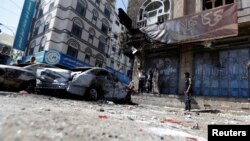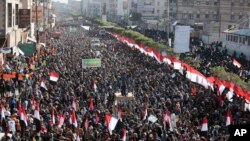Members of the United Nations Security Council are expressing deep concern about the situation in Yemen, a day after rebels killed the country's former president and their former ally, Ali Abdullah Saleh, following a spike in violence in the capital with the dissolution of their alliance.
“The latest developments in Yemen create a period of maximal risk, a zone of all dangers – both on the humanitarian and military front,” said France’s Permanent Representative to the United Nations François Delattre. “Our first priority is to silence weapons and to allow a complete and immediate humanitarian access on all Yemen and via all its ports and airports."
Following Saleh’s death, his son Ahmed Ali vowed to confront the Iran-aligned Houthi rebels.
In a statement, Ali said that he would "confront the enemies of the homeland and humanity, who are trying to obliterate its identity and its gains and to humiliate Yemen and Yemenis."
Britain's Deputy Ambassador to the U.N. Jonathan Allen said the escalation in fighting “couldn’t have come at the worse time for the people of Yemen.”
“There are nearly 8 million now who are in dire humanitarian need,” said Allen, “We need humanitarian access, we need commercial access and this is critical.”
U.N. Special Envoy for Yemen Ismail Ould Cheikh Ahmed briefed the Security Council during a closed-door meeting Tuesday.
U.N. spokesman Stephane Dujarric earlier told reporters the death of former President Saleh “adds an extreme level of complexity to already a very difficult political situation.”
Dujarric reiterated that the world body stands ready to broker a negotiated halt to the conflict that has left 10,000 people dead and millions in desperate need of humanitarian aid in Yemen since 2014.
The U.N. humanitarian coordinator for Yemen, Jamie McGoldrick, called for a humanitarian cease-fire on Tuesday to allow civilians to seek assistance.
"The streets of Sana'a city have become battlegrounds and people are trapped in their homes, unable to move out in search of safety and medical care and to access basic supplies such as food, fuel and safe water," McGoldrick said in a statement.
Saleh ruled Yemen for more than three decades before he was ousted under popular and political pressure in 2012, but continued to wield power behind the scenes, forming an alliance with the Iran-backed Houthis as they seized control of Sana'a in 2014 and forced President Abdu Rabu Mansour Hadi into exile.
Arab League chief Abul Gheit warned Tuesday that Saleh's killing could bring an "explosion in the security situation in Yemen."
Saleh's death Monday capped a dramatic stretch of days that followed him denouncing the Houthis and suggesting restoring ties with Saudi Arabia, which for two years has led a military coalition in support of Hadi.
"He was martyred in the defense of the republic," said Faiqa al-Sayyid, a leader of the General People's Congress, blaming Houthi rebels for Saleh's killing in south Sana'a.
The rebels said Saleh was on his way to Saudi Arabia when he was killed, calling his death the foiling of what they claim was his attempt at a "coup" against "an alliance he never believed in."
In a televised speech, Houthi leader Abdul-Malek al-Houthi called Saleh's killing a "dark day for the forces of the coalition."
Hadi, in his own address from Saudi Arabia, called on Yemeni people in Houthi-controlled areas to rise up against the rebels.
Clashes between fighters loyal to Saleh and the Houthis first erupted last week when Saleh accused the rebels of storming his giant mosque in Sana'a and attacking his nephew, the powerful commander of the special forces, Tarek Saleh.
Jamestown Foundation senior analyst Michael Horton told VOA on Tuesday while Saudi Arabia is “not capable of launching the kind of all out ground invasion that is necessary to defeat the Houthis,” the Saudis are likely to intensify the bombing.
“There is a real danger that the Saudis will escalate their bombing--this is already in evidence--and thereby exacerbate the already dire humanitarian situation in Yemen," Horton said. "An escalation by Saudi Arabia could in turn cause the Houthis to seek a closer relationship with Iran--as it is now, this relationship is limited at best."
Middle East Institute scholar Zubair Iqbal told VOA that Saleh went too far in supporting the group led by Saudi Arabia and the United Arab Emirates and wrongly expected those countries to provide forces to reinforce his own.
"Now the Houthis will never agree to anything that comes from the side of Saleh or his family or his friends," Iqbal said.
VOA's State Department Correspondent Nike Ching and Victor Beattie in Washington DC contributed to this report.






